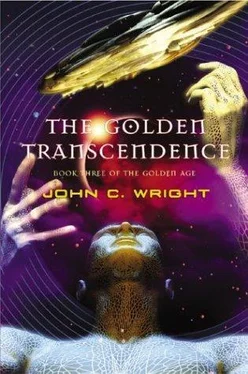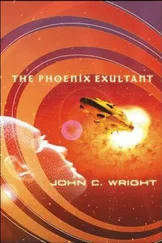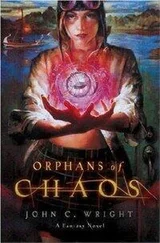The Sixth Mental Structure embraced the first entirely artificial consciousness. The rise of artificial intelligence was long anticipated and long delayed, but unlike every previous transition between eras, the transition from the Fifth to the Sixth Era was achieved peacefully and without error, since the wise legislators of the Unicameral and Polyhierarchical schola and the Maternalist biocompositions (such as Demeter Mother) had adjusted social institutions and political expectations to welcome the coming of the Sophotechs long before the first eletrophotonic artificial self-awareness passed the Descartean Cogito test.
The only true surprise was the universal rejection of the Sophotech minds to accept positions of political power or authority. They politely refused even voting enfranchisement. Their own politics among themselves was swift and incomprehensible, based on the alterations of deep structures and the adoption of priorities trees and compromises to avoid conflict; and yet, the message to living minds was simple and ancient. Violence can be avoided if all parties place a higher priority on cooperation than on conflict.
The Seventh Mental Structure is held to have begun when Sophotech investigations into noumenal mathematics (nonlinear yet nonchaotic models for uncertain complex systems, including, for example, human brain information) allowed the very long awaited creation of a science of noetics.
For the first time, mental information, both in whole and part, could be recorded, reordered, transmitted, saved, and manipulated in the same fashion as any other type of information. Downloads and partials could be recorded and summoned, and ghosts created from transcripts or speculative reconstruction.
NOETICS
The early period of the Seventh Mental Structure is also called the Time of the Second Immortality, for the defects of the Compositional mental noosophic recording systems were cured. Noumenal mathematics allowed for the modeling of essential and ineffable human memory characteristics, to such a level of fine detail that individual human minds could be recorded, duplicated, and reproduced; and differences between the original template and the copy were below detectable limits, both mechanical detection thresholds and the intuitive and emotional threshold that allowed the revenants' copies to be regarded as being one and the same as the originals by friends, family, and society. While philosophers and Sophotechs might recognize that the dead, despite all appearances, truly were dead, for all practical and legal purposes, any mind that had sufficient continuity of memory with his original template was considered to be that selfsame person.
POLITICAL SYSTEM
The political system of the Golden Oecumene had its roots in the time of the middle-period Fifth Mental Structure, and was inspired by the collective peace of the hive-minds of the Fourth Era, the civility of the Western democracies of the early Third Era, the respect for law and discipline that informed the Roman Empire of the Second.
The political protocols that controlled the exchanges of mental information processing priority were mostly unchanged from the Fourth Era; the human government, likewise, was based on antique Third Era philosophical notions of separation of powers, checks and balances, between competing magistrates and administrative bodies of strictly limited mandate.
Politics, which is the recourse to the use of force to organize interpersonal relationships, was unknown to the majority of the citizens of the Golden Oecumene. The Sophotechs, since the early Sixth Era, self-selected for mental architectures that would minimize irreconcilable differences of opinion; in effect, they had programmed themselves to make any self-sacrifice necessary to maintain the social order.
Following their lead, less intelligent artificial intellectual constructions had likewise embraced deep structures placing a high priority on compromise and harmony: mass-minds, Composition or noosophic formulations, likewise, filtered their mental inputs or patrons to avoid those activities that might give rise to legal clashes.
For that moiety of the human population that existed outside of an electronic matrix, mere was a Parliament (for humans) and a Meeting of the Minds (for independent machines and semi-machine consciousness), as well as a Curia, for the arbitration of legal disputes. These offices were rarely called upon, since simulations often anticipated their outcomes, and people relied heavily on the advice of the Sophotechs to avoid the economically wasteful zero-sum-game conflicts of interest.
This is not to say, of course, that grief and passion were unknown to the Golden Age. The maneuvering and intrigue within the voluntary corporations and philosophical movements and unions known as 'schools' were surrounded with the bitterness and zealotry that one might expect in any other forum. Unlike the political struggles of prior ages, however, these internal scholastic struggles led to frustration and loss of prestige but not to warfare and loss of life.
The Parliament was a diverse Composition consisting of partials, ghosts and self-aware entities granted representative power by the specific agency of specific constituents. Unlike the unwieldy political mechanisms of prior ages, the ability to create minds with the characteristics necessary to represent one's own interests zealously and faithfully rendered the elective process an anachronism.
Surrounding the Parliament were the Shadow Ministers, which consisted of a somewhat complex scheme of insurance companies and financial institutions, news reporters, policy analysts, and philosophers, and others who had an interest in the outcomes of political determinations. The various minds of the Ministers were organized into Compositions, or ghosts collectives, or simple standing instruction patterns.
The Shadow Ministers had investors sufficiently able to anticipate the needs and desires of the constituents of the Parliament members, to give clear warning to any parliamentarian who might otherwise pursue policies that would offend his electors.
The laws allowed for special elections to be held in such cases where the ability or honesty of these predictions was called into question. Unlike laws enforced by merely human agency, however,, these computer-enforced rules and rights did not need to be exercised periodically to retain their force.
The severely limited powers of the government in the Golden Age rendered government useless and unnecessary for the conduct of daily affairs of life. It had no power to aid or assist those who had, or who imagined, difficulties. Consequently, no one turned to it for aid in time of need; no social movement expended precious resources in an attempt to gain control of the organs of government, of the levers of power, because those organs were atrophied, and those levers were only connected to judicial institutions and police forces of severally limited operation. Most of the parliamentary debate turned on matters of taxation (i.e., Atkins's salary) and on defining the exact boundaries of public and private intellectual property.
Hence, the main power of the Golden Oecumene was not in its official delimitation of powers. The main social power during this period in history lay with the College of Exhortation.
THE HORTATORS
These Hortators, as they were called, were a response to the paradox of free government; namely, that free government is sufficiently limited in power to leave all nonviolent activities, i.e., the culture, in private hands; but that the cultural values allowing for such liberties must be maintained, and passed to the next generation, in order for the society to remain free. Unlike all prior governments, the Foederal Oecumenical Commonwealth could not use force to maintain the loyalty of her citizens to those values and mores she needed to survive; the unity of culture was maintained on a strictly voluntary basis.
Читать дальше










